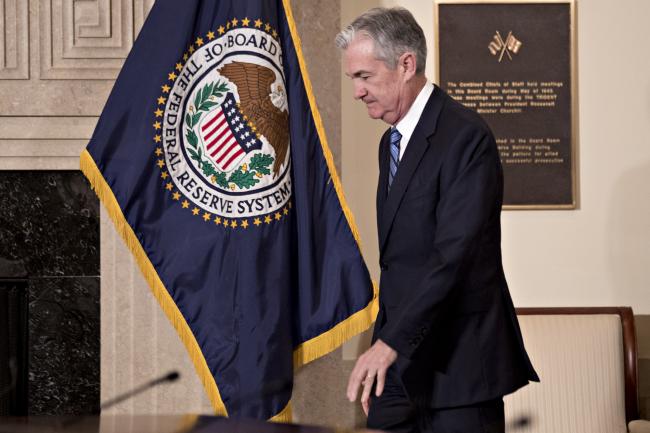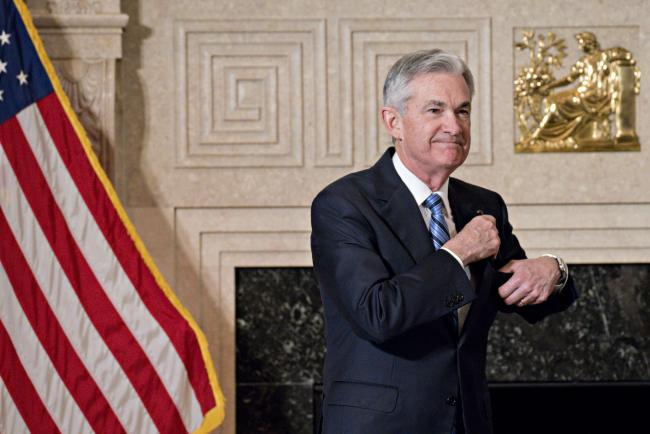(Bloomberg) -- Jerome Powell is the first Federal Reserve chairman in more than a decade to have any background in the private sector. That could explain changes he’s implemented in his first weeks on the job.
Powell has made it clear within the institution he wants more direct interaction with the Fed’s army of Ph.D. economists, and on a faster and more informal basis than sought by his predecessors, according to two Fed insiders familiar with the moves and who asked not to be identified.
The changes are more evolution than revolution, the people said. They build on other steps taken in recent years to relax a once-rigid system that strictly controlled the flow of information between politically appointed policy makers and the rank-and-file staff. Still, several former senior Fed officials said, it’s a notable shift in the way it flattens the central bank’s traditional hierarchy and further liberalizes internal communication.
Former Fed Vice Chairman Donald Kohn said he had no direct knowledge of Powell’s changes, but they struck him as positive steps that could help the new chairman as he attempts to shepherd the U.S. economy through an uncertain period of low unemployment, low inflation and still tepid, but quickening economic growth.
‘Loosening it Up’
“I don’t know that this is about getting alternative perspectives as much as it is about opening the funnel a bit,” Kohn said. “Loosening it up and also getting alternative perspectives and having informal conversations, that’s probably a good idea.”
Powell, who was sworn in as chairman on Feb. 5, is by many accounts a voracious reader of economic research. At the same time he lacks the academic grounding of Ph.D economists who have recently led the Fed, such as Ben Bernanke and Janet Yellen. Perhaps in recognition of that potential weakness, he’s keen to engage staff on topics that grab his attention.
Spur-of-the-moment exchanges between the chair and junior staffers would have been largely unthinkable at the Fed a generation ago. Even in recent years, a request for information would often result in a carefully vetted formal presentation that might take weeks to prepare and an hour to deliver.
Powell, who spent a dozen years in banking and private equity, has no patience for that, the two current insiders said. Nor does he want staff to over-invest their time in a complex production when all he needs is a substantive and frank discussion with just the right expert -- but right now.
Designated Responders
To accommodate this, division directors have each designated one or two lieutenants charged with responding to Powell’s requests, either by providing information themselves or by quickly rounding up the right economists to meet with the boss and answer his questions.
With these steps, Powell is taking aim at the last vestiges of the Fed’s ancien régime, a system that once gave enormous influence to the directors of the three key economic research divisions -- monetary affairs, research and statistics, and international finance. Even today, though it’s uttered in jest as often as in fear, those directors bear a famous nickname: the barons.
“That came from the head of personnel, who hated us,” said Edwin Truman, director of the division of international finance from 1977 to 1998, the hey-day of the barons. “He invented this term because he had so much difficulty dealing with us.”
Powerful Gatekeepers
The barons’ power stemmed mainly from their role as unchallenged gatekeepers, overseeing the flow of information between the decision makers on the Board of Governors, including the chair, and the staff.
That task had a practical side. It helped to manage the deluge of information that might influence monetary policy. They also had an interest in managing resources, and requests from policy makers that circumvented their offices could disrupt that. In his day, Truman conceded, that sometimes made for conflict.
“You could argue there was tension between division directors as gatekeepers and division directors as responsible for knowing who’s doing what,” he said.
Others have a less generous take on those days. To Alan Blinder, who served as vice chairman from 1994 to 1996, the barons enforced a rigid order that over-filtered information, suppressed internal debate and frequently kept Fed governors in the dark about important matters.
‘Information is Control’
“Information is control,” Blinder said. “If some of the governors don’t know about something and the staff does, that’s an advantage in terms of moving influence from the governors to the staff.”
Under Bernanke, the barons’ grip began to loosen. It became easier for governors to get an economist assigned exclusively to them to serve as an assistant and guide to the institution. After Yellen became chair, some measure of internal dissent was even encouraged.
In early 2014 the Fed’s internal website added an “alternative view” page, where individual economists can air their disagreements with official staff forecasts and positions. Also under Yellen in mid-2016, the staff created and the Board of Governors had access to an internal system known as the “data and analysis hub” where staffers share data, memos and papers about their topics of study.
Powell’s recent moves, which he initiated even before being sworn in as chair, are aimed at nudging things further, creating a more relaxed and ongoing exchange of knowledge.
Kohn, who served as both a baron and policy maker, said he hoped the division directors would embrace Powell’s changes.
“The whole point is to help decision makers come to the best possible decisions, and staff should do whatever seems to contribute to that outcome,” he said. “Different decision makers have different needs. If this is Jay’s need, they should adjust to it.”

